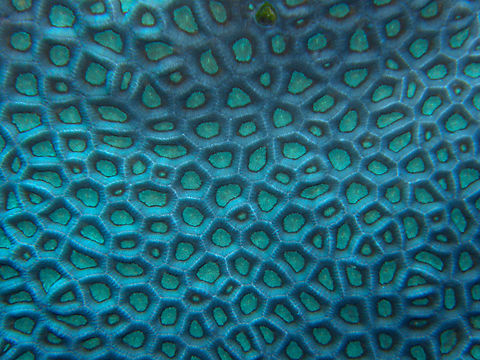
Appearance
This colony is in the shape of a more or less regular sphere that can exceed 1m in diameter. The interior of this madreporary presents empty spaces hence its name of lacuna, with thin internal walls uniformly spaced and plunging vertically. Its surface is composed of irregular corallites that merge together. Olive in color with pale green or whitish centre.Naming
Knob coral.Distribution
Western Indian Ocean, Red Sea.Habitat
Found in shallow exposed reef environments. 1-20m depth.Reproduction
The madreporaries are cnidarians which contain polyps living in a calcareous skeleton which they sometimes build in colonies. These polyps feed on small microphage organisms and nutrients generated by zooxanthellae algae that live in symbiosis in their tissues. These cnidarians can reproduce by cloning or by emission of male and female gametes which will give rise to larvae which will settle on a substrate. Generally, only a thorough examination of the calcareous skeleton can identify corals.References:
Some text fragments are auto parsed from Wikipedia.
https://www.marinespecies.org/aphia.php?p=taxdetails&id=288072http://souslesmers.free.fr/f.php?e=365
https://www.sealifebase.ca/summary/Favia-lacuna
http://pictolife.net/pages/popup.php?espece=Cnidaires&id=150&menu=8